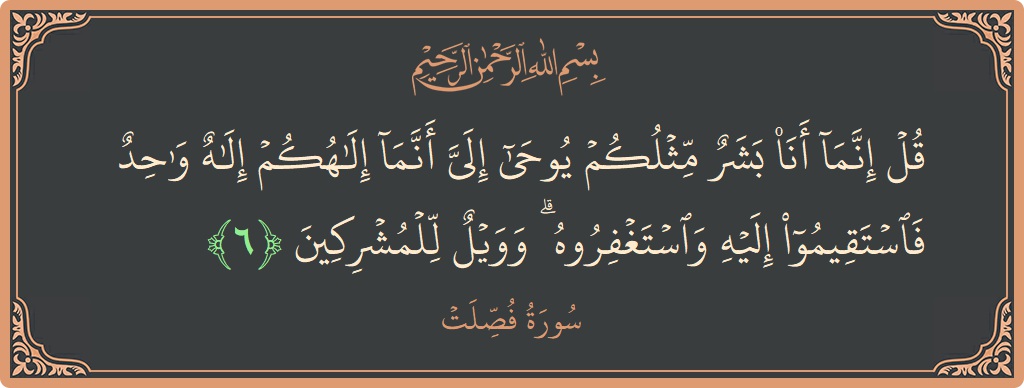Surah Fussilat: Verse 6 - قل إنما أنا بشر مثلكم... - English
Tafsir of Verse 6, Surah Fussilat
English Translation
Say, O [Muhammad], "I am only a man like you to whom it has been revealed that your god is but one God; so take a straight course to Him and seek His forgiveness." And woe to those who associate others with Allah -English Transliteration
Qul innama ana basharun mithlukum yooha ilayya annama ilahukum ilahun wahidun faistaqeemoo ilayhi waistaghfiroohu wawaylun lilmushrikeenaTafsir of Verse 6
Prophetic reply to the Denial and Ridicule of Disbelievers
The infidels saying that their hearts were covered and their ears were leaden, etc., was not because they had become deaf and bereft of intellect; rather it was a kind of ridicule and jest that they used to make. But the reply to this offensive ridicule that the Holy Prophet ﷺ was directed to give was not to be offensive in the like manner, but to express his humility that he ﷺ is not God, having authority over everything, rather he ﷺ is also a human being; the only difference is that his Lord has given him ﷺ guidance through wahy, and has supported him with miracles. It should have resulted in all of them declaring their faith in him. Even now they are advised to turn in worship and obedience to Allah only and to repent and renounce the past sins.
The Call to Tawhid Allah says,
(Say) `O Muhammad, to these disbelievers and idolators,'
(I am only a human being like you. It is revealed to me that your God is One God,) `not like these idols and false gods which you worship. Allah is one God,'
(therefore take straight path to Him) means, `worship Him Alone sincerely, in accordance with what He has commanded you through His Messengers.'
(and seek forgiveness of Him) means, `for your past sins.'
(And woe to the polytheists.) means, doom and destruction is their lot.
(Those who give not the Zakah) `Ali bin Abi Talhah reported from Ibn `Abbas that this means those who do not bear witness that there is no God except Allah. This was also the view of `Ikrimah. This is like the Ayat:
(Indeed he succeeds who purifies himself. And indeed he fails who corrupts himself.) (91:9-10) And;
(Indeed whosoever purifies himself shall achieve success. And remembers (glorifies) the Name of his Lord, and prays.) (87:14-15) And;
(And say to him: "Would you purify yourself") (79:18) What is meant by Zakah here is purification of the soul, ridding oneself of all bad qualities, the worst of which is Shirk. The Zakah paid on one's wealth is so called because it purifies wealth, and it is a means of increasing it, blessing it and making it more beneficial, and a means of assisting one to use it in doing good deeds. Qatadah said, "They withheld the Zakah of their wealth." This is the apparent meaning according to many of the scholars of Tafsir, and this is the view favored by Ibn Jarir. But the matter is subject to further examination, because the obligation of Zakah was instituted during the second year after the Hijrah to Al-Madinah, according to what is stated by several scholars. Yet this Ayah was revealed in Makkah. However, it is not unlikely that the principle of giving charity and Zakah was already in place and had been enjoined at the beginning of the Prophet's mission, as Allah says:
(but pay the due thereof on the day of their harvest) (6:141). As for the details of Zakah and how it is to be calculated according to the Nusub, were explained in Al-Madinah. This is how we may reconcile between the two opinions. Similarly, prayer was originally enjoined before sunrise and before sunset at the beginning of the Prophet's mission; it was only on the Night of the Isra', a year and a half before the Hijrah, that Allah enjoined upon His Messenger the five daily prayers. The conditions and essential elements of prayer were explained later, in stages. And Allah knows best. Then Allah says:
(Truly, those who believe and do righteous good deeds, for them will be an endless reward that will never stop.) Mujahid and others said, "It will never be cut off or decrease." This is like the Ayat:
(They shall abide therein for ever.) (18:3)
(a gift without an end) (11:108)
